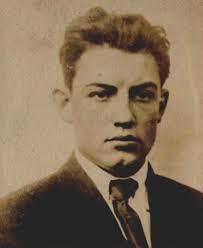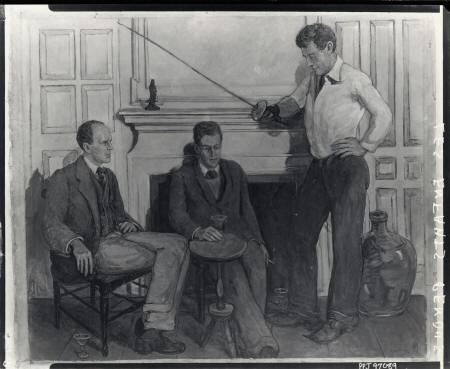Queer Places:
Yale University (Ivy League), 38 Hillhouse Ave, New Haven, CT 06520
29 Beekman Pl, New York, NY 10022
 Russell Wheeler
“Mitch” Davenport (1899 – April 19, 1954) was an American publisher
and writer. He was part of the
Literary Ambulance
Drivers during WWI. Russell Wheeler Davenport and Max Foster were
immortalized in Phelps Putnam’s poetry (and in a painting by
Russell Cheney) as “Les Enfants Pendus,”
which the poet translated as “the hung-up children.” The three of them are
depicted in the poem as hanging by their necks from a tree, although they are
not dead. Putnam wasn’t alone in his sexual conflicts. Among his close
friends, at least two, Mitch Davenport and
Farwell Knapp, offer striking
parallels to his own life: both were trapped in unhappy marriages and only
truly content when in the company of men they loved. In Davenport’s case, his
letters and journals reveal homosexual experiences in college, as well as a
lifelong sexual struggle that often left him depressed and bitter. In
addition, a third member of their group,
Charlie Walker (who’d also marry and
have children), was arrested in 1916 on an apparent morals charge, which
usually meant public homosexual activity. People like Putnam and Davenport,
who could never conceive of themselves as homosexual, despite their love for
other men. Homosexuals were fairies, pansies, or “little boys”—a label Cheney
once angrily derided as “filthy” when a friend used it to describe his largely
gay circle of friends. The number of suicides in Putnam’s circle is striking:
Farwell Knapp put a gun to his head;
Parker Lloyd-Smith, boon companion of Mitch Davenport, leaped from the
twenty-third floor of a building. Even
F.O. Matthiessen, the most
grounded of the whole group, plunged from the twelfth floor of a Boston hotel
in 1950, depressed over Cheney’s death and weary of being hounded for both his
homosexuality and his political views. Mitch Davenport professed to be in love
with Laura Barney Harding
and probably would have divorced his wife if Laura had given the nod. But
Mitch’s anguish over the suicide of his friend Parker Lloyd-Smith, with whom
he admitted he’d been “more than intimate,” seems to have given Laura pause.
Russell Wheeler
“Mitch” Davenport (1899 – April 19, 1954) was an American publisher
and writer. He was part of the
Literary Ambulance
Drivers during WWI. Russell Wheeler Davenport and Max Foster were
immortalized in Phelps Putnam’s poetry (and in a painting by
Russell Cheney) as “Les Enfants Pendus,”
which the poet translated as “the hung-up children.” The three of them are
depicted in the poem as hanging by their necks from a tree, although they are
not dead. Putnam wasn’t alone in his sexual conflicts. Among his close
friends, at least two, Mitch Davenport and
Farwell Knapp, offer striking
parallels to his own life: both were trapped in unhappy marriages and only
truly content when in the company of men they loved. In Davenport’s case, his
letters and journals reveal homosexual experiences in college, as well as a
lifelong sexual struggle that often left him depressed and bitter. In
addition, a third member of their group,
Charlie Walker (who’d also marry and
have children), was arrested in 1916 on an apparent morals charge, which
usually meant public homosexual activity. People like Putnam and Davenport,
who could never conceive of themselves as homosexual, despite their love for
other men. Homosexuals were fairies, pansies, or “little boys”—a label Cheney
once angrily derided as “filthy” when a friend used it to describe his largely
gay circle of friends. The number of suicides in Putnam’s circle is striking:
Farwell Knapp put a gun to his head;
Parker Lloyd-Smith, boon companion of Mitch Davenport, leaped from the
twenty-third floor of a building. Even
F.O. Matthiessen, the most
grounded of the whole group, plunged from the twelfth floor of a Boston hotel
in 1950, depressed over Cheney’s death and weary of being hounded for both his
homosexuality and his political views. Mitch Davenport professed to be in love
with Laura Barney Harding
and probably would have divorced his wife if Laura had given the nod. But
Mitch’s anguish over the suicide of his friend Parker Lloyd-Smith, with whom
he admitted he’d been “more than intimate,” seems to have given Laura pause.

Les Enfants Pendus [painting], "Russell Cheney, 1881-1945: A Record of his Work with notes by F. O. Matthiessen," New York: Oxford University Press, 1947.
.jpg)
Yale University, New Haven, CT
Davenport was born in Bethlehem, Pennsylvania, the son of Russell W.
Davenport, Sr., a vice president of Bethlehem Steel, and Cornelia Whipple
Farnum.
In his journals, he writes of love for women, particularly his first
fiancée, in an idealized way. Since love for women was so sacred, Davenport
wrote, he “suppressed” his “animal desires” for them—which, he then
rationalized, came out “highly unnaturally,” that is, through sex with men. In
college, he had a sexual relationship with his classmate
Robert Chapman "Bob" Bates, later
a professor of French literature at Yale. Bates seems to have wanted the
relationship to continue, writing love sonnets to Davenport. He asked him at
one point, after clearly being rebuffed, “Ah, Mitch—are you still seeking
‘experience’? Are you still looking for material for novels—are you still that
same strange self of yours, forever just not happy?”
He served with the U.S. Army in World War I and received the Croix de
Guerre. He enrolled at Yale University and graduated in 1923, where he was
classmate of Henry Luce and Briton Hadden, who founded Time magazine. While at
Yale he became a member of the secret society Skull and Bones.[1]
In 1929, he married the writer Marcia Davenport (Marcia Davenport’s novel, Of
Lena Geyer, is based on her mother, Alma
Gluck’s longterm lesbian relationship); they divorced in 1944. Marcia and Russell Davenport had a daughter, Cornelia Whipple Davenport, in 1934. He
joined the editorial staff of Fortune magazine in 1930 and became managing
editor in 1937.
At age forty-one, he turned to politics and became a personal and political
advisor to Wendell Willkie. Willkie was the Republican nominee for the 1940
presidential election and lost the election to Franklin D. Roosevelt. After
Willkie's death in 1944, Davenport became a defacto leader of the
internationalist Republicans.
Following World War II, he was on the staff of Life and Time
until 1952. In 1944, Simon and Schuster published one of his works, "My
Country, A Poem of America". His book The Dignity of Man was
published posthumously in 1955.
My published books:


BACK TO HOME PAGE

 Russell Wheeler
“Mitch” Davenport (1899 – April 19, 1954) was an American publisher
and writer. He was part of the
Literary Ambulance
Drivers during WWI. Russell Wheeler Davenport and Max Foster were
immortalized in Phelps Putnam’s poetry (and in a painting by
Russell Cheney) as “Les Enfants Pendus,”
which the poet translated as “the hung-up children.” The three of them are
depicted in the poem as hanging by their necks from a tree, although they are
not dead. Putnam wasn’t alone in his sexual conflicts. Among his close
friends, at least two, Mitch Davenport and
Farwell Knapp, offer striking
parallels to his own life: both were trapped in unhappy marriages and only
truly content when in the company of men they loved. In Davenport’s case, his
letters and journals reveal homosexual experiences in college, as well as a
lifelong sexual struggle that often left him depressed and bitter. In
addition, a third member of their group,
Charlie Walker (who’d also marry and
have children), was arrested in 1916 on an apparent morals charge, which
usually meant public homosexual activity. People like Putnam and Davenport,
who could never conceive of themselves as homosexual, despite their love for
other men. Homosexuals were fairies, pansies, or “little boys”—a label Cheney
once angrily derided as “filthy” when a friend used it to describe his largely
gay circle of friends. The number of suicides in Putnam’s circle is striking:
Farwell Knapp put a gun to his head;
Parker Lloyd-Smith, boon companion of Mitch Davenport, leaped from the
twenty-third floor of a building. Even
F.O. Matthiessen, the most
grounded of the whole group, plunged from the twelfth floor of a Boston hotel
in 1950, depressed over Cheney’s death and weary of being hounded for both his
homosexuality and his political views. Mitch Davenport professed to be in love
with Laura Barney Harding
and probably would have divorced his wife if Laura had given the nod. But
Mitch’s anguish over the suicide of his friend Parker Lloyd-Smith, with whom
he admitted he’d been “more than intimate,” seems to have given Laura pause.
Russell Wheeler
“Mitch” Davenport (1899 – April 19, 1954) was an American publisher
and writer. He was part of the
Literary Ambulance
Drivers during WWI. Russell Wheeler Davenport and Max Foster were
immortalized in Phelps Putnam’s poetry (and in a painting by
Russell Cheney) as “Les Enfants Pendus,”
which the poet translated as “the hung-up children.” The three of them are
depicted in the poem as hanging by their necks from a tree, although they are
not dead. Putnam wasn’t alone in his sexual conflicts. Among his close
friends, at least two, Mitch Davenport and
Farwell Knapp, offer striking
parallels to his own life: both were trapped in unhappy marriages and only
truly content when in the company of men they loved. In Davenport’s case, his
letters and journals reveal homosexual experiences in college, as well as a
lifelong sexual struggle that often left him depressed and bitter. In
addition, a third member of their group,
Charlie Walker (who’d also marry and
have children), was arrested in 1916 on an apparent morals charge, which
usually meant public homosexual activity. People like Putnam and Davenport,
who could never conceive of themselves as homosexual, despite their love for
other men. Homosexuals were fairies, pansies, or “little boys”—a label Cheney
once angrily derided as “filthy” when a friend used it to describe his largely
gay circle of friends. The number of suicides in Putnam’s circle is striking:
Farwell Knapp put a gun to his head;
Parker Lloyd-Smith, boon companion of Mitch Davenport, leaped from the
twenty-third floor of a building. Even
F.O. Matthiessen, the most
grounded of the whole group, plunged from the twelfth floor of a Boston hotel
in 1950, depressed over Cheney’s death and weary of being hounded for both his
homosexuality and his political views. Mitch Davenport professed to be in love
with Laura Barney Harding
and probably would have divorced his wife if Laura had given the nod. But
Mitch’s anguish over the suicide of his friend Parker Lloyd-Smith, with whom
he admitted he’d been “more than intimate,” seems to have given Laura pause.
.jpg)

